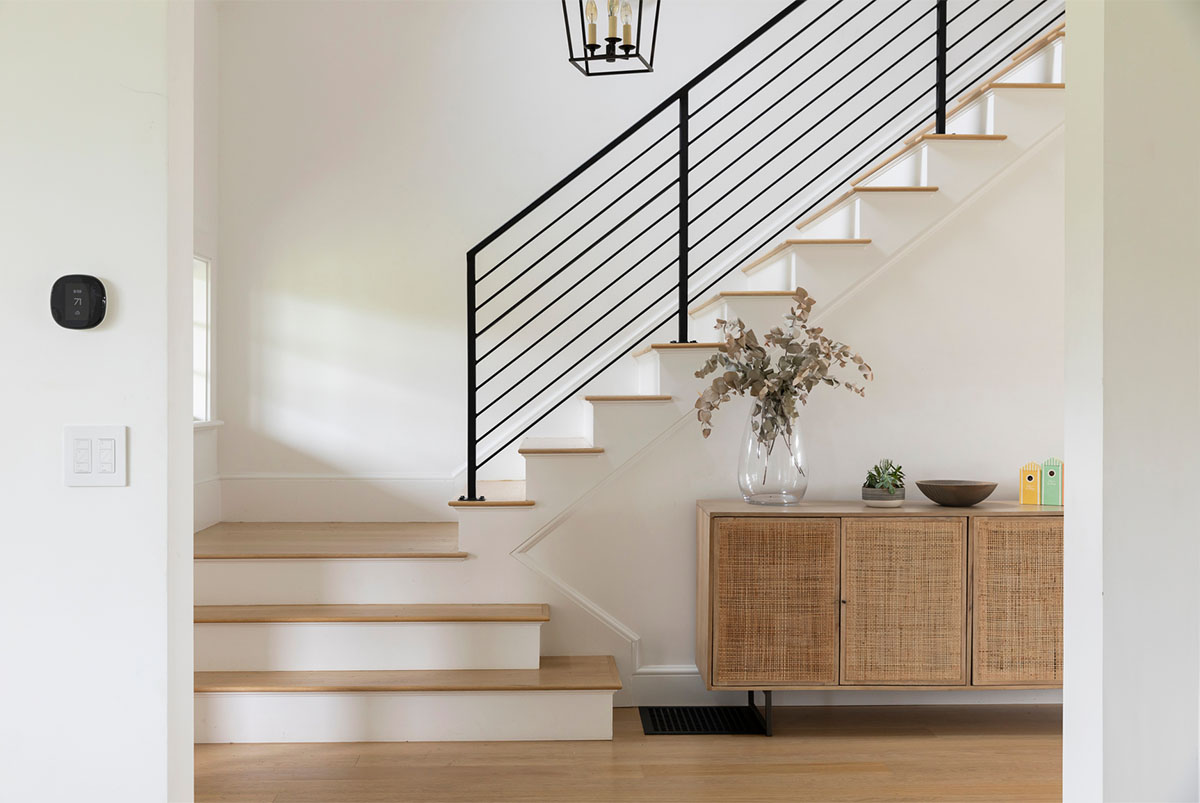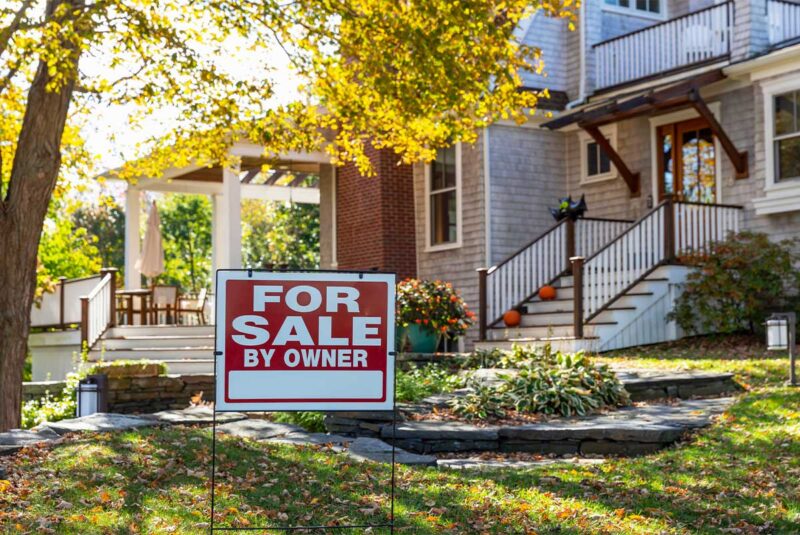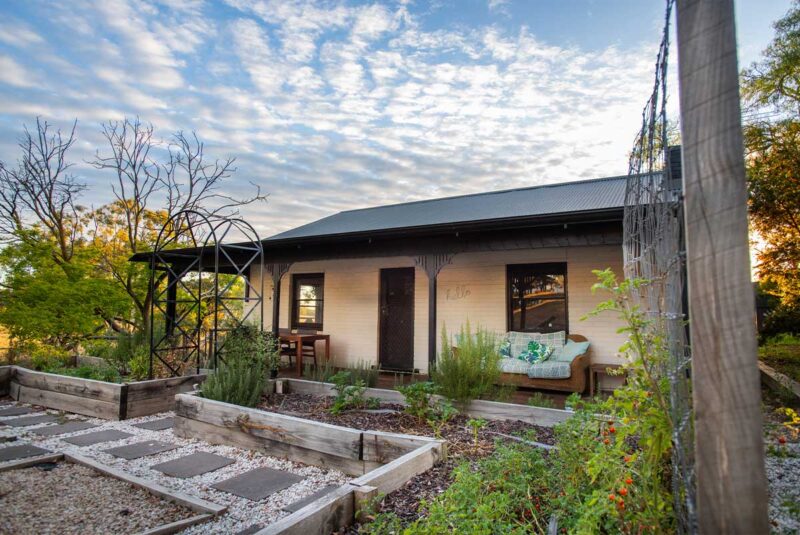Ready To Buy a Home?
Get Approved to Buy a Home
Rocket Mortgage® lets you get to house hunting sooner.
There’s something special about buying a custom-made home. A new construction house gives you the freedom to design your own home to your particular specifications. Just don’t forget that new construction homes come at a premium, and you’ll have to endure a lot of planning and waiting.
Even if you don’t want a fully customized home, buying a new construction home still might be a good option – especially if you’re one of the millions of frustrated home buyers battling with competing offers in a seller’s market.
In this article, we’ll cover the process of purchasing a newly constructed home, guiding you on the benefits and drawbacks, what to expect and some tips to help you along the way.
What To Know About New Construction Homes
A new construction is a home that’s brand new and hasn’t been occupied by anyone else.
There are several ways to buy a new construction home, including:
- Purchasing vacant land and building a new construction home on it
- Buying an existing house, demolishing it and building a new construction in its place
- Buying a new construction home in an existing neighborhood
- Buying a new construction home in a new subdivision
- Buying a unit in a new construction condominium
- Buying a new construction townhome
As you can see, there’s more than one way to get your hands on a new construction home. The steps are similar to buying any home. But is buying a new construction home better than buying a house that’s been around for a while?
Cost of Buying a New Construction Home
While new constructions usually cost more than older homes, that difference has increased dramatically over the past year. In May of 2022, new construction cost roughly 10% more than old construction when comparing median sales price. In February of 2023, the gap shot up to over 20%.[1][2]
Part of the reason new construction homes are more expensive is because builders have to make money for all the time and effort that goes into constructing one. While it’s hard to pinpoint the average markup on new construction homes, the National Association of Home Builders reported builders had a net profit margin of 7% in 2020.[3]
On the other hand, new construction homes usually have good resale value. In addition to using newer materials and construction techniques that are more energy efficient, a new construction will often have a more modern design that appeals to home buyers.
Find out what you can afford.
Research what your monthly payment might look like with our intuitive mortgage calculator.
The Process for Buying a New Build Home
The process of purchasing a new construction home has many of the same steps as buying an existing home – with a few deviations along the way.
Decide which type of new construction home is right for you
The first step in purchasing a newly constructed home is deciding which type of new construction you want to buy. There are three main types of new construction homes: tract homes, custom homes and spec homes.
- Tract homes: Tract homes are constructed by builders who purchase a plot of land and split it into smaller lots to build individual homes. Builders construct these homes in large quantities, with little or no variation between them.
- Custom homes: This is the most expensive type of new construction home, but it gives you the most freedom. Think of custom homes like custom clothing – completely tailored from scratch to incorporate your personal preferences.
- Spec homes: Spec homes – short for speculative homes – are houses constructed by a builder who’s speculating on what home buyers might want. The builder puts thought and effort into the home’s design, though their style might not match the buyers’.
Choose a mortgage lender and get preapproved
Unless you plan to pay with cash upfront, the next step in buying a new home is finding a lender to finance your new construction. Since there are different types of loans you can use to finance the purchase of a new construction home, you’ll want to work with a mortgage lender who has the relevant experience to provide proper guidance.
Although you might take out a traditional mortgage on a tract home that’s already been built, it might be more appropriate to look into a construction loan or bridge loan to pay for a custom home. Regardless of the loan type you choose, you’ll want to get preapproved, so you can present yourself as a serious buyer.
Hire a real estate agent who’s experienced with new constructions
Many real estate agents specialize in certain types of properties. If you’re looking for a newly constructed home, hire a real estate agent who has experience working with buyers of new construction houses.
Choose a location
Location, location, location. You’ve heard it a thousand times before, and that’s because it’s such an important part of the home buying process. You can build a new home or make improvements to an existing home, but you’re going to have a difficult time changing the location.
When evaluating where you want to build or buy your new construction home, it’s important to evaluate:
- The school district
- Public transit options
- Local amenities, like shopping and parks
- Crime rates
- Proximity to your workplace
- Property taxes
- Whether there’s a homeowners association (HOA)
Research builders and home construction companies
You should thoroughly investigate builders and construction companies – and their previous projects – before deciding which one to entrust with building your home.
Here are some questions should you ask when researching builders and home construction companies:
- What else have you built?
- How long have you been building homes?
- Do you have proof of insurance?
- How many other properties in the subdivision have sold?
- What’s included in the price?
- What help/resources are available for purchasing a new build home?
- How long will building take, and will you put in a longstop completion date (the deadline for finishing the project)?
- Are there any restrictive covenants, encumbrances or other restrictions on how you can use the property?
- What’s included with the new home warranty?
- Can I purchase appliances or materials?
You can also ask your real estate agent for a recommendation, and – as with anything else – you can benefit from reading online reviews about the companies you’re considering doing business with.
Design your home
For fully custom homes, you should at least hire an architect and a general contractor.
Before ground is broken on your new home, you’ll need to select some basic details for your house. This can include how many square feet the house should be, how many levels it should have and your preferred number of bedrooms and bathrooms.
Thankfully, most builders can help you get started by showing you some examples of model homes, floor plans and finishes – like countertops and cabinet hardware – which can help give you some ideas for what you want your house to look like.
Your home building team will be able to walk you through all the steps in designing your new construction home, including the zoning and permitting requirements, budget, finishes and more.
Inspections
Unfortunately, just because something is new doesn’t mean things can’t go wrong, and it certainly doesn’t mean you should forgo a formal inspection. If you’re buying a new construction home, you should have an experienced inspector come out to make sure everything is in working order.
If there are any defects or concerns, create a checklist of tasks to be completed before project completion. Then, once the builder has addressed these items, have the inspector revisit the property again to make sure all issues have been fully resolved.
Final walkthrough
During your final walkthrough, make sure to bring a checklist of everything you want to inspect, including, but not limited to:
- The home’s exterior
- Doors and windows
- Appliances
- Lights
- Sinks and toilets
- Floors, walls and ceilings
- Cabinets
If you find a defect, make sure to document the issue and notify your real estate agent ASAP. At this stage of the game, most home builders are quick to provide a solution, since they want to get to closing. This is why it’s imperative to do a thorough walkthrough before you give the go-ahead to move forward to closing.
Close on your new home
Congratulations! Closing on a new home is an exciting milestone in your life and one that should be celebrated. And how do you celebrate? By signing your autograph on all the paperwork, of course.
Closing on your new home will usually take around 1 – 2 hours, during which time you’ll be asked for your signature multiple times. So make sure to bring an ergonomic pen or get ready for some nasty hand cramps. But don’t worry, it’ll all be worth it when you’re handed the keys to your very own, brand-new home.
Pros and Cons of New Construction Homes
Buying a new construction home has some distinct advantages over buying an older house, but each option has benefits and drawbacks. Ultimately, deciding whether to buy a new house or an old house comes down to budget and personal preference.
PROS of buying new construction👍
Finding your dream home in your price range can be virtually impossible. By customizing a new construction home, you can design the home of your dreams.
New construction homes are far less likely to require maintenance than older homes, simply because everything in them is new.
Technology has advanced almost every part of a home – and we’re not just talking about smart thermostats and high-tech security systems. New construction homes are more energy efficient all around, from the windows and doors to appliances and air conditioning.
The builder of a new construction home may offer a warranty on their work. A builder’s warranty can range from 1 – 10 years, offering coverage on things like structural defects.
CONS of buying new construction👎
With new construction homes, prices can be a moving target. And let’s be honest, those prices typically move in one direction: up. A custom home built to your personalized tastes is a wonderful way to create your dream space, but the costs can quickly get out of hand.
A lot of materials and work go into building a new construction home, so prepare to endure at least a 6- to 12-month wait if you’re planning to build a new home. Keep in mind that the landscaping is also new. It’ll take time for trees and grass to realize their full potential.
If you buy a new construction home but don’t choose the builder, there’s no telling how well the home was made. Though it might be rare, ending up with a bad or inexperienced builder could leave you with a poorly built home and a handful of problems.
We’ve all seen neighborhoods filled with homes that all look eerily alike. If you’re buying a semi-custom home, there’s a good chance your home will look similar to the other homes in the development.
To Build or Not To Build
Choosing a new construction home can come with plenty of unique benefits, but it’s not for everyone. If you have the funds to buy a new construction home and don’t mind the wait, you’ll probably enjoy the modern finishes and reduced maintenance associated with a new home.
But if you want to move into a fully developed neighborhood or have a limited budget and timeline, buying an existing home might be a better fit.
FAQs about buying new construction
Depending on how handy you are, you can opt to skip upgrades that are easy to do yourself – for example, putting on a fresh coat of paint. Usually, you can also save money and improve your selection by waiting on kitchen upgrades, like new cabinets or the backsplash style.
Yes, you can negotiate on almost everything – from the purchase price and who pays closing costs, to what goes into the home to begin with.
The down payment requirement depends on the type of mortgage you get. If you qualify for a U.S. Department of Veterans Affairs (VA) loan, you can buy the house without a down payment. For a conventional loan, the minimum down payment requirement is usually 5%.
Take the first step toward buying a home.
Get approved. See what you qualify for. Start house hunting.
The Short Version
- A new construction home will often have a more modern design that appeals to home buyers, in addition to being more energy efficient
- The price difference between new constructions and older homes has increased. The median sales price for new construction homes was 20% higher than old construction homes in February 2023[1][2]
- The biggest difference between buying a new construction and an older home is that you should take the time to research the builder. You may also get to add input on design
Federal Reserve Bank of St. Louis. “Median Sales Price for New Houses Sold in the United States.” Retrieved April 2023 from https://fred.stlouisfed.org/series/MSPNHSUS
Federal Reserve Bank of St. Louis. “Median Sales Price of Existing Homes.” Retrieved April 2023 from https://fred.stlouisfed.org/series/HOSMEDUSM052N
National Association of Home Builders. “Builders’ Profit Margins Fall as Balance Sheets Grow.” Retrieved April 2023 from https://www.nahb.org/blog/2022/04/eye-post#




